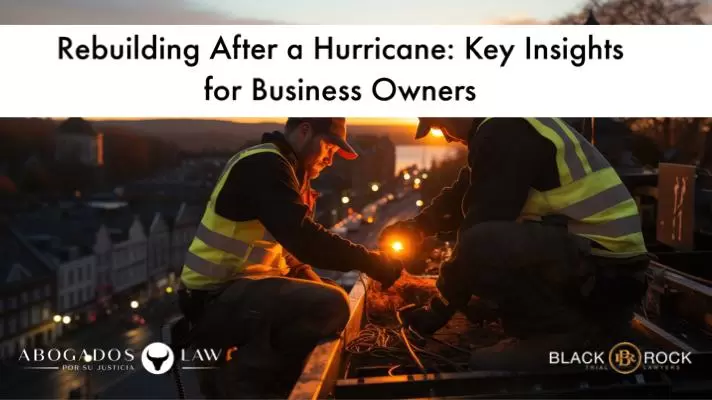Natural disasters like hurricanes can have long-lasting effects on businesses, especially in areas like Florida, where hurricanes such as Helene and Milton have left many business owners facing significant challenges. If your business has been impacted, taking swift, informed action is essential to ensure a successful recovery.
1. Assess and Document the Damage
The first step after a hurricane is ensuring the safety of yourself, your employees, and your business premises. Once it’s safe to do so, carefully assess the damage. Take comprehensive photographs and videos of the damage to your property, inventory, and equipment. Documentation is key not only for insurance claims but also for potential legal disputes. Ensure you do not begin repairs before your insurance provider has completed their assessment unless you are instructed otherwise.
2. Business Interruption Insurance
Business interruption insurance (or business income insurance) can be a lifeline for businesses in the aftermath of a disaster. This type of coverage helps cover the loss of income when a business cannot operate due to physical damage. Be sure to review your policy to understand what is covered and how to file a claim. Typically, this insurance can help with:
- Lost revenue based on historical financial data.
- Ongoing expenses such as rent, payroll, and utilities.
- Relocation costs if your business must temporarily move.
- Loan payments that must be made despite the interruption.
Tip: If you don’t already have business interruption insurance, consider adding it to your policy in the future. Additionally, review your existing insurance to make sure your coverage is sufficient, especially in light of recurring natural disasters in Florida.
3. Access to Financial Assistance
In the wake of a hurricane, financial recovery programs like those offered by the U.S. Small Business Administration (SBA) can provide vital assistance. Here’s a summary of SBA loan options:
- Business Physical Disaster Loans: For repairing or replacing damaged buildings, equipment, and inventory.
- Economic Injury Disaster Loans (EIDL): To cover everyday operational costs if your business has been disrupted.
- Home and Personal Property Loans: If your home or personal property (like cars or equipment) used in your business was damaged.
- Military Reservists Economic Injury Loans: If key employees are called to military duty, this loan helps cover operating expenses.
- Mitigation Assistance: Financial support to protect your business from future disasters.
Be mindful of the filing deadlines:
- Hurricane Helene: November 27, 2024 (physical damage); June 30, 2025 (economic injury).
- Hurricane Milton: December 10, 2024 (physical damage); July 11, 2025 (economic injury).
4. Florida Small Business Emergency Bridge Loan Program
Florida has activated a $50 million Small Business Emergency Bridge Loan Program for those impacted by Hurricane Milton. This program offers zero-interest, short-term loans to small businesses that have experienced economic injury or physical damage. Business owners, including sole proprietors, can apply online at www.FloridaJobs.org/EBL through December 4, 2024, or until funds run out. These loans can be a crucial stopgap to maintain operations while awaiting insurance payouts or other assistance.
5. Practical Business Recovery Strategies
In addition to financial relief, here are some practical steps to help you get your business back on its feet:
- Prioritize Cash Flow Management: In the immediate aftermath, maintaining cash flow is critical. Analyze your current financials and cut unnecessary expenses. If necessary, communicate with creditors and lenders about potential payment deferrals. Review any agreements you have in place to see if there are clauses that allow for delayed payments or leniency due to disaster circumstances.
- Reassess Your Business Plan: Post-disaster recovery is an opportune time to revisit your business model. Is there a need to shift operations to a more disaster-resilient structure? For example, could remote work options for staff minimize future disruptions? Could diversifying your revenue streams reduce risk? Consider how these changes could not only help you recover but also safeguard your business from future disruptions.
- Employee Assistance: Your employees may also be affected by the hurricane, and their well-being directly impacts your business. Offering flexibility, such as remote work options or adjusted schedules, can help retain your workforce during tough times. Additionally, explore state and federal resources that may help your employees access financial assistance or temporary housing support.
- Re-engage with Your Customers: It’s vital to keep the lines of communication open with your customers. Use social media, email newsletters, or other channels to update them on your status, any temporary closures, or changes in your services. Consider offering special promotions or incentives once you reopen to attract business back.
- Supply Chain Management: Hurricanes often disrupt supply chains. Reach out to your suppliers to assess their operational status and find temporary alternatives if necessary. Building relationships with multiple suppliers can provide more flexibility in future emergencies.
- Prepare for Future Disasters: As Florida is no stranger to hurricanes, it’s prudent to make long-term investments in disaster preparedness. Create or update a detailed business continuity plan that includes:
- Backup systems for critical data.
- An emergency communication plan for employees.
- Securing a disaster recovery fund, whether through savings or insurance.
- Assessing and mitigating risks for physical damage, such as installing storm shutters, securing outdoor equipment, or relocating inventory to safer locations.
6. Legal Considerations and Contracts
Review your business contracts with vendors, clients, and employees to understand your rights and obligations in the event of natural disasters. Many contracts include “force majeure” clauses, which may relieve you from certain responsibilities due to uncontrollable events like hurricanes. Be sure to consult with a business attorney to fully understand how these clauses affect your contractual obligations.
By staying informed and proactive, business owners can navigate the complex process of recovery with greater confidence. For more personalized guidance, consulting with a business attorney can help ensure that you are taking the necessary steps to protect your business now and in the future.
Written by Gil Sanchez, Esq.
Representing People + Businesses Throughout Florida
Offering Business + Entrepreneurship Legal Services:
1:1 Consultations
A La Carte Legal Services
“BELAW” Business & Entrepreneurship Law Advisory Program
Master Sessions
Civil Litigation Services



